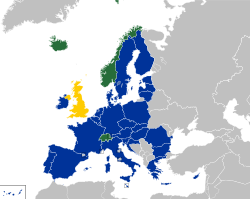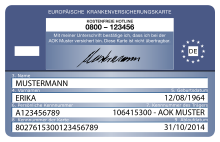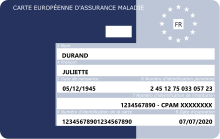| European Health Insurance Card | |
|---|---|
 Example of a Slovenian EHIC card Example of a Slovenian EHIC card | |
 Validity of EHIC cards Validity of EHIC cards | |
| Issued by | Member states of the European Economic Area Switzerland United Kingdom |
| First issued | 1 June 2004 |
| Purpose | Access to free or reduced cost health services in any EEA member state, Switzerland and the United Kingdom |
| Valid in | European Economic Area Switzerland United Kingdom |
| Eligibility | EEA, Swiss or UK residency |
| Cost | Free |
| European Union decision | |
| Text with EEA relevance | |
 | |
| Title | Decision No 189 of 18 June 2003 aimed at introducing a European health insurance card to replace the forms necessary for the application of Council Regulations (EEC) No 1408/71 and (EEC) No 574/72 as regards access to health care during a temporary stay in a Member State other than the competent state or the state of residence |
|---|---|
| Made by | The Administrative Commission |
| Journal reference | |
| Current legislation | |


The European Health Insurance Card (EHIC) is issued free of charge to anyone who is insured by or covered by a statutory social security scheme of the EEA countries or Switzerland and certain citizens and residents of the United Kingdom. It allows holders to receive medical treatment in another member state in the same way as residents of that state—i.e., free or at a reduced cost—if treatment becomes necessary during their visit (for example, due to illness or an accident), or if they have a chronic pre-existing condition which requires care such as kidney dialysis. The term of validity of the card varies according to the issuing country. The EEA countries and Switzerland have reciprocal healthcare arrangements with the United Kingdom, which issues a UK Global Health Insurance Card (GHIC) valid in the EEA countries and, in most cases, in Switzerland.
The intention of the scheme is to allow people to continue their stay in a country without having to return home for medical care, and does not cover people who have visited a country for the purpose of obtaining medical care, or non-urgent care that can be delayed until the individual returns to their home country (for example, most dental care). The costs not covered by self-liability fees are paid by the issuing country, which is usually the country of residence, but may also be the country from which the patient receives the most pension.
The card only covers healthcare which is normally covered by a statutory health care system in the visited country; additional costs can be met by taking out travel insurance.
History
The card was phased in from 1 June 2004 and throughout 2005, becoming the sole healthcare entitlement document on 1 January 2006.
It replaced the following medical forms:
- E110 – For international road hauliers
- E111 – For tourists
- E119 – For unemployed people/job seekers
- E128 – For students and workers in another member state
Territorial applicability
The card is applicable in all French overseas departments (Martinique, Guadeloupe, Réunion, and French Guiana) as they are part of the EEA, but not non-EEA dependent territories such as Aruba, or French Polynesia. However, there are agreements for the use of the EHIC in the Faroe Islands and Greenland, even though they are not in the EEA.
Personal eligibility
The card exists because the right to health care in the European Union is based on the country of legal residence, not the country of citizenship. Therefore, a passport is not enough to receive health care. It is however possible that a photo ID document is asked for, since the European Health Insurance Card does not contain a photo.
In some cases, even if a person is covered by the health insurance of an EU country, one is not eligible for a European Health Insurance Card. For instance, in Romania, a person who is currently insured has to have been insured for the previous five years to be eligible.
Third party application processors
European Health Insurance cards are provided free to all legal residents of participating countries. There are however various businesses who act as non-official agents on behalf of individuals, arranging supply of the cards in return for payment, often offering additional services such as the checking of applications for errors and general advice or assistance. This has proved extremely controversial. In 2010 the British government moved against companies that invited people to pay for the free EHIC, falsely implying that through payment the applicant could speed up the process.
Participating member states
As of 2021, 31 countries in Europe participate: the 30 member states of the European Economic Area (EEA) plus Switzerland. This includes the 27 member states of the European Union (EU) and 4 member states of the European Free Trade Association (EFTA).
 Austria
Austria Belgium
Belgium Bulgaria
Bulgaria Croatia
Croatia Cyprus
Cyprus Czech Republic
Czech Republic Denmark
Denmark Estonia
Estonia Finland
Finland France
France Germany
Germany Greece
Greece Hungary
Hungary Iceland
Iceland Ireland
Ireland Italy
Italy Latvia
Latvia Liechtenstein
Liechtenstein Lithuania
Lithuania Luxembourg
Luxembourg Malta
Malta Netherlands
Netherlands Norway
Norway Poland
Poland Portugal
Portugal Romania
Romania Slovakia
Slovakia Slovenia
Slovenia Spain
Spain Sweden
Sweden Switzerland
Switzerland
United Kingdom
The United Kingdom was a participant in the scheme as a member of the European Union until its withdrawal from the union. It continued to participate provisionally until the end of the Brexit transition period on 31 December 2020.
The EU–UK Trade and Cooperation Agreement grants continued reciprocal healthcare access between the EU and the UK. EU citizens can continue to use their EHIC within the UK, while EHIC in the UK was replaced by a UK Global Health Insurance Card (GHIC). Since 2022, some UK citizens and permanent residents are eligible for a new UK-issued EHIC valid for visits to these countries as well as to Switzerland. Eligible persons are those who meet one of the following criteria:
- those living in the European Union, Switzerland, Norway, Iceland, or Liechtenstein, and have been since before 1 January 2021 with a registered S1, E121, E106 or E109 form issued by the UK
- those living in the EU, Switzerland, Norway, Iceland, or Liechtenstein, since before 1 January 2021 with an A1 issued by the UK
- those who are a national of the EU, Switzerland, Norway, Iceland, or Liechtenstein who have legally resided in the UK since before 1 January 2021 and are covered under the Withdrawal Agreement; one may not be covered if they also a UK national or if they were born in the UK
- those who are a family member or dependant of an entitled individual already listed
- those who fall under the court rulings Chen v Home Secretary(UK) or Bashar Ibrahim and Others v Bundesrepublik Deutschland or their carer
During its participation in the scheme, EHIC access covered the British overseas territory of Gibraltar. The crown dependencies of the Channel Islands and Isle of Man were not covered by the EHIC as they were never members of the EU and EEA, and their residents were not eligible for EHICs.
See also
- Healthcare in the European Union
- Italian health insurance card
- Carte Vitale
- National identity cards in the European Economic Area
- European driving licence
- Passports of the European Union
Notes
- The legal acquis is identified as EEA-relevant by the EU, and is incorporated into the EEA Agreement (by Iceland, Liechtenstein and Norway).
- Under the Brexit Withdrawal Agreement, the UK continues to issue EHIC to certain individuals who gained entitlement before 1 January 2021.
- Only EU member state-issued EHIC are valid after 31 December 2020. EHIC issued by EFTA members may remain valid where the individual has an ongoing relationship with the UK that started before 1 January 2021.
- Only EU/EFTA citizens, UK state pensioners, frontier workers, workers posted abroad and students studying in the EU on or before 31 December 2020 and eligible family members resident in the UK are entitled to apply for an EHIC.
References
- "Brexit : De la paperasse et des coûts supplémentaires en vue pour les Britanniques". Le Monde.fr. 13 July 2020.
- "Get healthcare cover for travelling abroad". nhsbsa.nhs.uk. NHS Business Services Authority. 15 August 2018. Retrieved 6 January 2021.
- "EUR-Lex - 32003D0751 - EN - EUR-Lex". eur-lex.europa.eu. Retrieved 26 August 2020.
- ^ "Healthcare for UK nationals visiting the EU". GOV.UK. Retrieved 2021-01-01.
- "Are foreigners really gaming the NHS to pay for their medical treatment abroad?". Guardian. 11 August 2015. Archived from the original on 23 September 2021. Retrieved 22 August 2015.
- "UK FCO Travel Advice: French Polynesia". Fco.gov.uk. 2012-09-12. Retrieved 2012-10-12.
- "UK FCO Travel Advice: Denmark". Fco.gov.uk. Retrieved 2012-10-12.
- "Cardul european de asigurări de sănătate, eliberat gratuit". Libertatea.ro. 2009-08-01. Retrieved 2012-10-12.
- "Third Party Application Processors". 2016-09-02. Archived from the original on 2020-07-29. Retrieved 2016-06-03.
- "BBC News - European health card scam stopped by OFT". Bbc.co.uk. 2010-08-10. Retrieved 2012-10-12.
- "Consumers warned to be search engine savvy – Consumer Focus Wales". Consumerfocus.org.uk. 2011-06-22. Retrieved 2012-10-12.
- "European Health Insurance Card". European Commission. Retrieved 2019-05-07.
- "Press corner".
- "Brexit: EU diplomats briefed on Brexit trade deal". BBC News. 25 December 2020.
- "Apply for a free European Health Insurance Card (EHIC)". nhs.uk. 2018-08-15. Retrieved 2021-01-01.
- "Health - Switzerland travel advice".
- "Applying for healthcare cover abroad (GHIC and EHIC)". nhs.uk. 2021-01-11. Retrieved 2023-01-10.
- Kunqian Catherine Zhu and Man Lavette Chen v Secretary of State for the Home Department, 19 October 2004, retrieved 2024-05-04
- Joined Cases C-297/17, C-318/17, C-319/17 and C-438/17: Judgment of the Court (Grand Chamber) of 19 March 2019 (requests for a preliminary ruling from the Bundesverwaltungsgericht — Germany) — Bashar Ibrahim (C-297/17), Mahmud Ibrahim and Others (C-318/17), Nisreen Sharqawi, Yazan Fattayrji, Hosam Fattayrji (C-319/17) v Bundesrepublik Deutschland, Bundesrepublik Deutschland v Taus Magamadov (C-438/17) (Reference for a preliminary ruling — Area of freedom, security and justice — Common procedures for granting and withdrawing international protection — Directive 2013/32/EU — Article 33(2)(a) — Rejection by the authorities of a Member State of an application for asylum as being inadmissible because of the prior granting of subsidiary protection in another Member State — Article 52 — Scope ratione temporis of that directive — Articles 4 and 18 of the Charter of Fundamental Rights of the European Union — Systemic flaws in the asylum procedure in that other Member State — Systematic rejection of applications for asylum — Substantial risk of suffering inhuman or degrading treatment — Living conditions of those granted subsidiary protection in that other State), 2017, retrieved 2024-05-04
- "Who is entitled to a UK's European Health Insurance Card (EHIC) after Brexit". 2 February 2020.